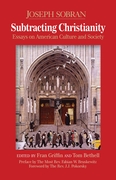
FGF Op-Ed
Guest Columnist
August 29, 2016

The Times are Out of Joint
A review of Subtracting Christianity: Essays on American Culture and Society,
a collection of essays by Joseph Sobran
by Robert Royal
[Special from The Catholic Thing] — Two quite intelligent women came by independent of one another this week, one an accomplished hospital nurse who specialized in exotic diseases, the other a longtime educational specialist with wide artistic interests. Very different personalities, but eerily alike in expressing, without provocation, their deep distress at “not understanding anything” anymore. Not understanding America or the president, the Church or the pope, the world and its seeming descent into a cultural wasteland and social chaos.
My “intellectual” friends talk about such things all the time, without much doing anything about it — and to be, fair it’s not easy to say what is to be done. One thing that’s only seemly, however: you shouldn’t be talking big about what needs doing unless you yourself are actually doing something. Italian has a word (coined from Shakespeare’s Hamlet) — “amletico” — for the kind of narcissist who indulges in eloquent, self-regarding, moral soliloquies, but doesn’t ever really do anything.
I take more seriously the witness of those two intelligent women, who would laugh at being called intellectuals. They don’t pretend to have answers, but reflect the deep disorientation that many “normal” folk feel these days. Reassurances from president or pope — both of whom sometimes seem strangely unfazed about the very persons and forces causing the anxiety — don’t change their intuitions that the times are profoundly, wildly “out of joint” (to quote Hamlet).
Where to turn when foundations appear to be eroding? Personally, more frequent prayer and fasting. It doesn’t seem to have done much for the world, but it’s done a lot for me. We have here no abiding city. Taking that truth to heart — and seeing what a mercy it is — is hard. No one enjoys feeling that what we once thought solid is crumbling. But in this sterner school there may be a purer hope. And perhaps unexpected rebirths. The Franciscans and Dominicans and Jesuits were not born in tranquil times, but in crises.
Reassurances from president or pope don't change their intuitions that the times are profoundly, wildly “out of joint” (to quote Hamlet).
And in the meantime, there are some helpful and uplifting guides. I’ve just been re-reading one of them, Joe Sobran, who died five years ago at only 64. Joe was a friend — often endearing, almost as often exasperating — for three decades. He was perhaps the closest thing to a genius I’ve ever known. He had a novel theory about the Earl of Oxford as the real author of “Shakspeare” (his preferred spelling, and before you laugh, you better be able to match his near word-for-word knowledge of the plays); he could drive you crazy over Jews and Israel (for a year or more I couldn’t talk with him because of it); and he was quixotic enough to run for vice president (Conservative Party).
Fran Griffin, a sainted soul who kept Joe from even earlier demise, and Tom Bethell, a loyal friend, have collected many of his columns and other writings in Subtracting Christianity: Essays on American Culture and Society. I’d have chosen a more affirmative title, but don’t let that deter you from rushing out to buy it. Brilliant insights — frequently drop-dead funny — jump off every page.
Like these, on the milquetoast, modern, expurgated Jesus:
The Franciscans and Dominicans and Jesuits were not born in tranquil times, but in crises.
“The message that you should be nice to others and refrain from stuff like imperial exploitation would hardly have transformed the ancient world and haunted the conscience of mankind for several civilizations to come. A man who preached such watery doctrine wouldn’t be worth crucifying.”
“If you want to contend that the Gospels are a pack of lies and that Jesus never said all these things or performed all those wonders, you should at least admit that Christianity is the most brilliant hoax of all time. . . .How could a few unlearned and provincial Jews invent such a supremely memorable character, endow him with the ability to speak immortal words on all occasions?”
“He is incomparable; he never reminds us of anyone else.”
That and much more on the person of Christ and the Church, but there's equally stunning insight about our postmodern, post-Christian descent into a new dark age:
“The new hypocrisy consists in pretending that nothing is wrong when everything is all wrong.”
“Liberalism has become the hypocrisy of pretending we don't know good from evil.”
Of course, liberalism in our time also has its absolutist, tyrannical side, which has become even clearer since Sobran wrote — in speech codes, microaggressions, trigger warnings, anti-smoking, anti-trans-fat, enviro-moralisms, etc. This only seems to be a double standard: the single standard behind the inconsistency is a concealed and consistent ideology.
“Toleration” would be redefined to include the “right” of killing children in the womb and homosexual “marriage” ... Traditional religions became, by definition, “intolerant.” The modern state, of course, has now become the arbiter of “tolerance.”
“For liberalism, God Himself is a tyrant, the only tyrant. This explains liberalism’s utter indifference to (and secret approval of) the persecution of Christianity, the untold story of the twentieth century.”
“They see racial discrimination anywhere as a ‘civil rights issue,’ but religious discrimination, even to the point of savage attacks on believers, never shows up on their moral radar screen.”
Joe made this observation in an essay that drew on my book on the 20th century martyrs, but he prefaced it with a historical understanding of how we got to such a state. It began with the “taming” of Western religions, when “tolerance” was still a workable expedient for getting along in religiously pluralistic societies.
In our disjointed days, as we are all groping for something solid, there are few more amusing or enlightening companions than Joe Sobran.
But “toleration” would be redefined to include the “right” of killing children in the womb and homosexual “marriage” — changes classical liberalism never dreamt of. Traditional religions became, by definition, “intolerant.” The modern state, of course, has now become the arbiter of “tolerance.”
This collection ends with brief essays on Islam. Of course, we now hear a lot about tolerance towards Muslims and, properly understood, that’s only right. But Sobran had already grasped that a double movement was underway: our elites defend Islam as a way to further dilute our old Western and Biblical identity. But they ignore that Muslims themselves, even moderate Muslims, just like traditional Christians, Jews, and all morally serious persons — recoil from our promiscuous, materialistic culture — which (as in the Paris massacres) the more virulent Islamic movements cite as a motive for their desire to destroy the West.
There’s much more here, a good bit of it less political and polemical than just humanly wise. In our disjointed days, as we are all groping for something solid, there are few more amusing or enlightening companions than Joe Sobran.
###
Copyright © 2016 by Robert Royal and The Catholic Thing. All rights reserved. Reprinted with permission.
Robert Royal is editor-in-chief of The Catholic Thing, and president of the Faith & Reason Institute in Washington, D.C. His most recent book is A Deeper Vision: The Catholic Intellectual Tradition in the Twentieth Century, published by Ignatius Press. The God That Did Not Fail: How Religion Built and Sustains the West, is now available in paperback from Encounter Books..
Get your copy of the Sobran anthology, Subtracting Christianity, at FGF Books or Amazon or iTunes.
A mission of the Fitzgerald Griffin Foundation is to publish and promote Sobran's writing. To help us with this mission, please donate online or by calling us at 877-726-0058, or by sending your tax-deductible donation to:
FGF
713 Park St., SE
Vienna, VA 22180
© 2016 Fitzgerald Griffin Foundation
